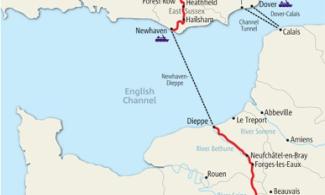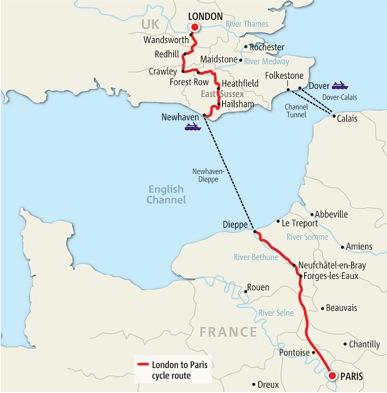
We are tired of hearing that a Kikuyu man will do this or a Luo woman will not do that. We are tired of seeing de facto no rent policies applied to Igbos in Lagos by unscrupulous Yoruba Landlords and de facto no rent policies applied to Yorubas in Abuja by unscrupulous Igbo Landlords. We are tired of hearing of unrealistic minimum capital requirements applied in African countries to businessmen from fellow African countries. We are tired of seeing state governors deporting indigenes from other ethnic groupings. We are tired of seeing our South African brethren's “necklacing” their African cousins.
Prologue: Uchenna (Victor) and Ahmed will be cycling from London to Paris on 22 August 2014 to
a) Raise awareness on the need for African unity and for people of different ethnic groupings to live in harmony
b) Raise money for the Africa Educational Trust to help children and young people from conflict-affected regions of Africa access education and training.

Why are we riding?
Across the globe it is very rare for nation builders to make every day decisions such as who to marry or date, who to do business with, who to hire or fire, where to live, who to rent a property to and who to vote for based on ethnicity of a homogenous race. The more common form of discrimination, which has been legislated against in some societies, is racism. However in Africa we live our lives daily through the tainted prism of intra tribalism within countries and inter tribalism across countries with great fanfare. In modern day Africa, loyalty to ethnicity takes precedence over loyalty to country and continent.
Most countries in Africa are made up of various ethnicities. Some countries such as Lesotho, Burundi and Rwanda are relatively more homogenous societies than the other African countries in which majority of the population belong to a certain ethnic grouping not greater than 3 . While other countries like Nigeria, Congo and Tanzania are more diverse having over a hundred different ethnicities. Unfortunately, in many parts of Africa, members of the different ethnicities find it difficult to live together. In 21st century Africa, tribalism still plays a destructive role. It is very common for a member of a particular ethnicity to predict, presume or justify the action of another ethnicity based on some historic stereotype that has been passed down flippantly from one generation to another. Most of the wars taking place in Africa are founded on tribalism, painted on tribalism and cemented on tribalism. These wars have lead to the death of millions of innocent souls. The Biafran war resulted in over 2 million civilians dying of starvation; the Rwandan Civil War resulted in around a million deaths within a hundred day period while the Second Congo War resulted in 5.4 million deaths.
We are tired of hearing that a Kikuyu man will do this or a Luo woman will not do that. We are tired of seeing de facto no rent policies applied to Igbos in Lagos by unscrupulous Yoruba Landlords and de facto no rent policies applied to Yorubas in Abuja by unscrupulous Igbo Landlords. We are tired of hearing of unrealistic minimum capital requirements applied in African countries to businessmen from fellow African countries. We are tired of seeing state governors deporting indigenes from other ethnic groupings. We are tired of seeing our South African brethren's “necklacing” their African cousins.
If a Caucasian landlord refuses to rent his apartment to an African in the USA or if a British boss calls a Black employee a racial epithet, it will be called racism and a big time civil rights activist will be called in to lead the protest. However, here in Africa we are seeing Africans killing Africans because of ethnicity; we are witnessing Africans not renting to Africans because of ethnicity; we are hearing of Africans refusing to do business with Africans because of ethnicity and we are watching Africans deporting Africans because of ethnicity.
We believe tribalism is the cancer inflicting all African countries and it is hindering the development of the African continent. It is preventing the election of capable leaders across all strata of leadership in most African countries, fostering civil wars and fuelling hate where there should be love and understanding. Tribalism is preventing cooperation amongst diverse ethnicities in a lot of African countries and cooperation amongst African countries. In other words, tribalism is a weapon of mass destruction and the root of all evils in Africa.
The authors of this essay, Uche and Ahmed come from 2 distinct ethnicities in Nigeria. Uche is from the Igbo ethnic group in Eastern Nigeria and Ahmed is from the Yoruba ethnic group in West Nigeria. Ahmed and Uche are good friends who met during a CFA networking event organised by the CFA Institute in London in 2006. It’s worth noting that friendship among people of different ethnicities is not an exception in Nigeria or the rest of Africa.
The purpose of this article is to promote greater solidarity and cooperation among all ethnic groupings in Africa and to that end we are cycling from London to Paris on the 22nd of August over 3 days. We have chosen these two cities because of the historical conflicts between Britain and France. A couple of hundreds of years ago, Britain and France were engaged in a series of wars including the famous Hundred Years' War. However despite the differences in languages, culture and opinions between these two countries, citizens from both countries now live in relative peace with each other. As we cycle from London and Paris those who see us cycle will not see Ahmed, the Yoruba man and Uche the Igbo man instead, they will see two men of African descent cycling from one city to another. We also know that cycling from London to Paris is no mean feat, but together we can achieve this feat. We have both trained very hard for the ride. Ahmed has been training by stair climbing, skipping and cycling around Jersey, while Uche has been concentrating on cycling around London and sprinting. While Ahmed is geographically challenged and finds it difficult understanding maps, he will be relying on Uche’s understanding of maps to get to Paris. On the other hand, Uche will be relying on Ahmed for logistical support. Individually we might not be able to complete the ride, but together we can do it.
We hope our article and our campaign highlights the urgent need for Africans to break the jinx of division by imaginary differences fanned by tribalistic jingoism within our countries and across the continent. We hope Africans take responsibility of every facet of African lives and stop pandering to other non African countries "western" aid to relieve our man made problems initiated by years of historical/colonial inequalities and exacerbated by apathy amongst Africans. It’s a vicious circle that we have to work to end. Some parts of Africa do not have any natural disasters yet we receive aid from our man made disasters.
For Africans to solve the problem we have to a Kwame Nkrumah mindset that we can solve our problems, teach our children, and do things ourselves and we need to change the way leaders are elected in Africa by educating the young ones on the power of the vote and to question their leaders. A lot of people say leadership is our problem but we believe every nation gets the leader they deserve. In Nigeria, Chief MKO Abiola won the election free and fair but because of tribalism he never got a chance.
We think one way to solve the problem of tribalism and corruption is to let capable Africans of different ethnic groupings run major organisations in various parts of Africa. There should also be free movement of people across the continent. For instance, an Ewe woman should be free to manage an Akan local government and vice versa. Or a Zimbabwean man could run a Zambian city as Mayor and vice versa. It might sound extreme given the inherent hostility between ethnicities but it can happen and work if given a chance. Ghana has turned to the IMF to bail it out but why can’t ECOWAS find a solution? Why can’t there be mobility of Central Bank Governors within the continent? Mark Carney is Canadian but he runs the British Central Bank. On the political front, perhaps Africans can form an organisation of “Administrators Without Borders” where various districts in Africa advertise for capable/proven managers within the continent to come and run a district or region.
When the colonialists came to Africa, they were able to conquer the continent partly due to the disunity among us. It is therefore time for us Africans to look beyond the narrow confine of ethnicity and see ourselves as one. A wise man by the name of Kwame Nkrumah once said, "Africa is one continent, one people, and one nation. The notion that in order to have a nation it is necessary for there to be a common language, a common territory and common culture has failed to stand the test of time or the scrutiny of scientific definition of objective reality." In other words, Nkrumah was rephrasing the words of Apostle Paul, by implicitly arguing that there is neither Yoruba nor Igbo, Zulu nor Xhosa, Shona nor Ndebele, Kikuyu nor Luo; Tutsi nor Hutu; Ewe nor Akan for we are all one.
About Africa Educational Trust
Africa Educational Trust (AET) has helped over 750,000 disadvantaged children and young people from Africa to access education and training. AET operates mainly in conflict-affected regions of Africa. Such areas often receive little international aid for education, as donors tend to limit their support to immediate humanitarian assistance. Yet conflict-affected areas have the lowest levels of access to education in the world. AET specialises in developing creative, innovative approaches to providing access to learning in these challenging environments. Much of its current work takes place in South Sudan, Somalia and Uganda.
Why your support is so important
Through your contribution, you are helping young people in conflict regions of Africa have access to education.
How to donate
Donating through JustGiving is simple, fast and totally secure. It's easy to donate online with a credit or debit card - just go to our JustGiving page:
https://www.justgiving.com/UcheAhmed-CycleForAfrica
JustGiving sends your donation straight to Africa Educational Trust and automatically reclaims Gift Aid if you're a UK taxpayer, so your donation is worth even more. We hope you'll join us in supporting Africa Educational Trust.
If you believe in the cause - please circulate this article to your contacts
Give generously!
To keep in touch kindly send a request to be added to our distribution email address [email protected]
Many thanks.
Uchenna Ndu, CFA Ahmed Sule, CFA